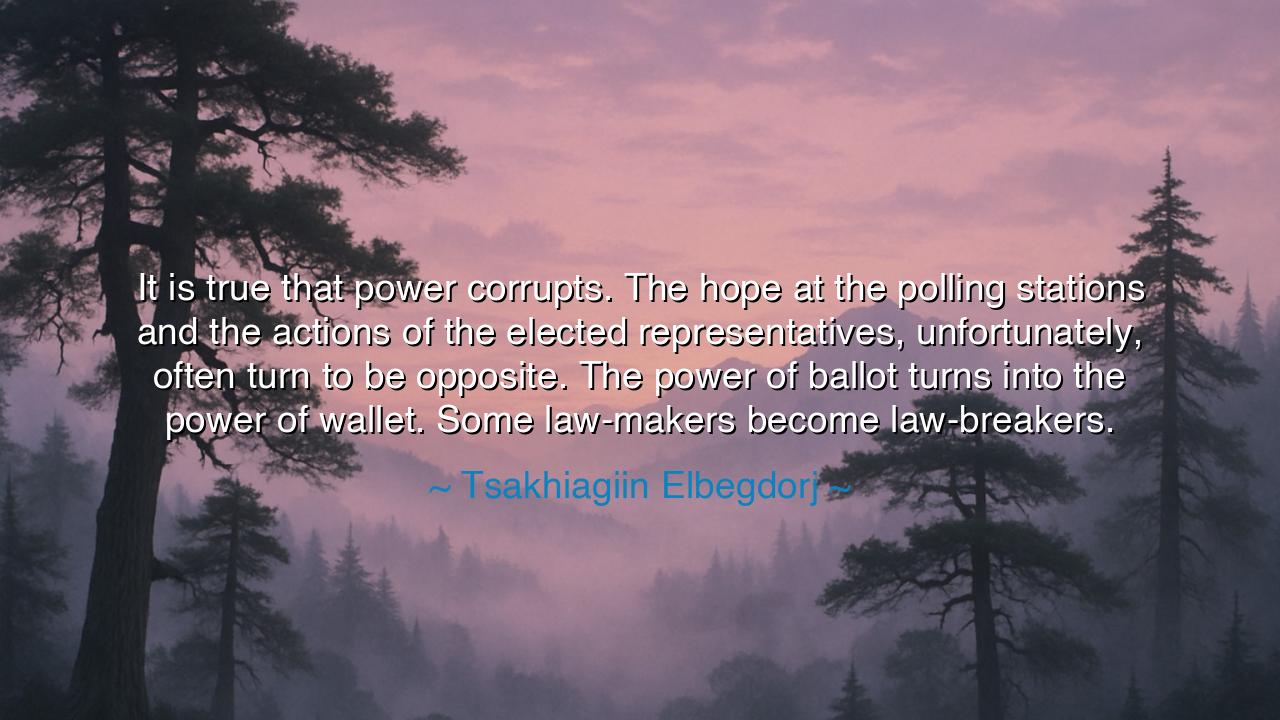
It is true that power corrupts. The hope at the polling stations
It is true that power corrupts. The hope at the polling stations and the actions of the elected representatives, unfortunately, often turn to be opposite. The power of ballot turns into the power of wallet. Some law-makers become law-breakers.






In the solemn and piercing words of Tsakhiagiin Elbegdorj, the Mongolian reformer and statesman, there echoes an ancient truth that nations have learned and forgotten countless times: “It is true that power corrupts. The hope at the polling stations and the actions of the elected representatives, unfortunately, often turn to be opposite. The power of ballot turns into the power of wallet. Some law-makers become law-breakers.” In these words lies both lament and warning — a cry born of wisdom and experience. Elbegdorj speaks as one who has seen democracy’s promise twisted by human greed, as one who understands that even the noblest system can be poisoned when those entrusted with power forget their duty to the people.
The origin of this quote comes from Elbegdorj’s reflections on political transformation in Mongolia, a nation that rose from the ashes of communism to embrace democracy. As one of the architects of that rebirth, he had witnessed firsthand the people’s hope at the polling stations — the sacred belief that through the ballot, justice and equality would prevail. But over time, he also saw corruption creep like a shadow into the halls of power. Those who had once vowed to serve began instead to serve themselves. The dream of freedom was replaced by the thirst for wealth. Thus, his words bear the weary tone of a man who loves his country deeply and yet knows how fragile righteousness can be when power falls into the hands of the unworthy.
To say that “power corrupts” is not new — it is a truth spoken by sages for millennia. Lord Acton once wrote, “Power tends to corrupt, and absolute power corrupts absolutely.” Yet Elbegdorj adds a modern echo to this ancient warning. In the age of democracy, corruption no longer wears a crown or sits upon a throne. It wears a suit, makes promises, and smiles before the cameras. The danger is no longer tyranny from above, but betrayal from within. When those chosen by the people abandon the sacred trust of their office, when the power of ballot becomes the power of wallet, the very foundation of freedom trembles. For the law itself becomes hollow when law-makers become law-breakers.
History offers us countless examples of this decay. Think of Rome, once the world’s proudest republic. Its citizens gathered to elect consuls and senators, believing their votes would protect liberty. Yet as wealth and influence grew, corruption seeped into the heart of the Senate. Votes were bought, justice was sold, and soon the republic that had conquered the world could not govern itself. Julius Caesar’s rise to power was not the cause of Rome’s fall — it was the symptom of a people whose guardians had already betrayed them. Thus, democracy, like a sacred flame, can be extinguished not by enemies, but by those who claim to defend it while secretly feeding on its light.
And yet, Elbegdorj’s words are not only a condemnation — they are also a call to vigilance and renewal. The people must never forget that their responsibility does not end at the polling station. Freedom is not maintained by a single act of voting, but by constant watchfulness, by courage to speak truth to power, and by the willingness to hold leaders accountable. A democracy without conscience becomes as dangerous as a monarchy without mercy. The citizens, therefore, must become the guardians of their own liberty, remembering that every vote is both a weapon and a covenant — a promise that must be defended, not forgotten.
Let us also remember that not all who rise to power are corrupted. There are those rare souls — the Mandela, the Lincoln, the Gandhi — who see power not as privilege, but as burden and service. They remind us that the cure to corruption is not cynicism, but integrity; not despair, but duty. A true leader understands that power is only borrowed — a trust granted by the people and judged by history. Such leaders walk humbly, act justly, and serve selflessly, knowing that the highest form of authority is not domination, but example.
Therefore, my children of democracy, take this teaching to heart: do not worship power, but watch it. Do not be seduced by words, but measure deeds. When leaders forget the poor, speak. When officials twist the law, resist. When corruption grows, do not look away. For as Elbegdorj teaches, the decay of power begins with the silence of the people. Let the fire of conscience burn brighter than the glitter of wealth, and let justice be the measure of every heart that dares to lead.
And so, let this wisdom endure through the ages: the power of the ballot is sacred, but it must never become the power of the wallet. Laws are noble, but only if law-makers live by them. Power will always tempt, but character can overcome temptation. As long as there are those who dream of a purer world and act upon that dream, democracy will live — fragile, yet enduring — a testament to the eternal struggle between corruption and conscience, between greed and grace, between power and truth.






AAdministratorAdministrator
Welcome, honored guests. Please leave a comment, we will respond soon